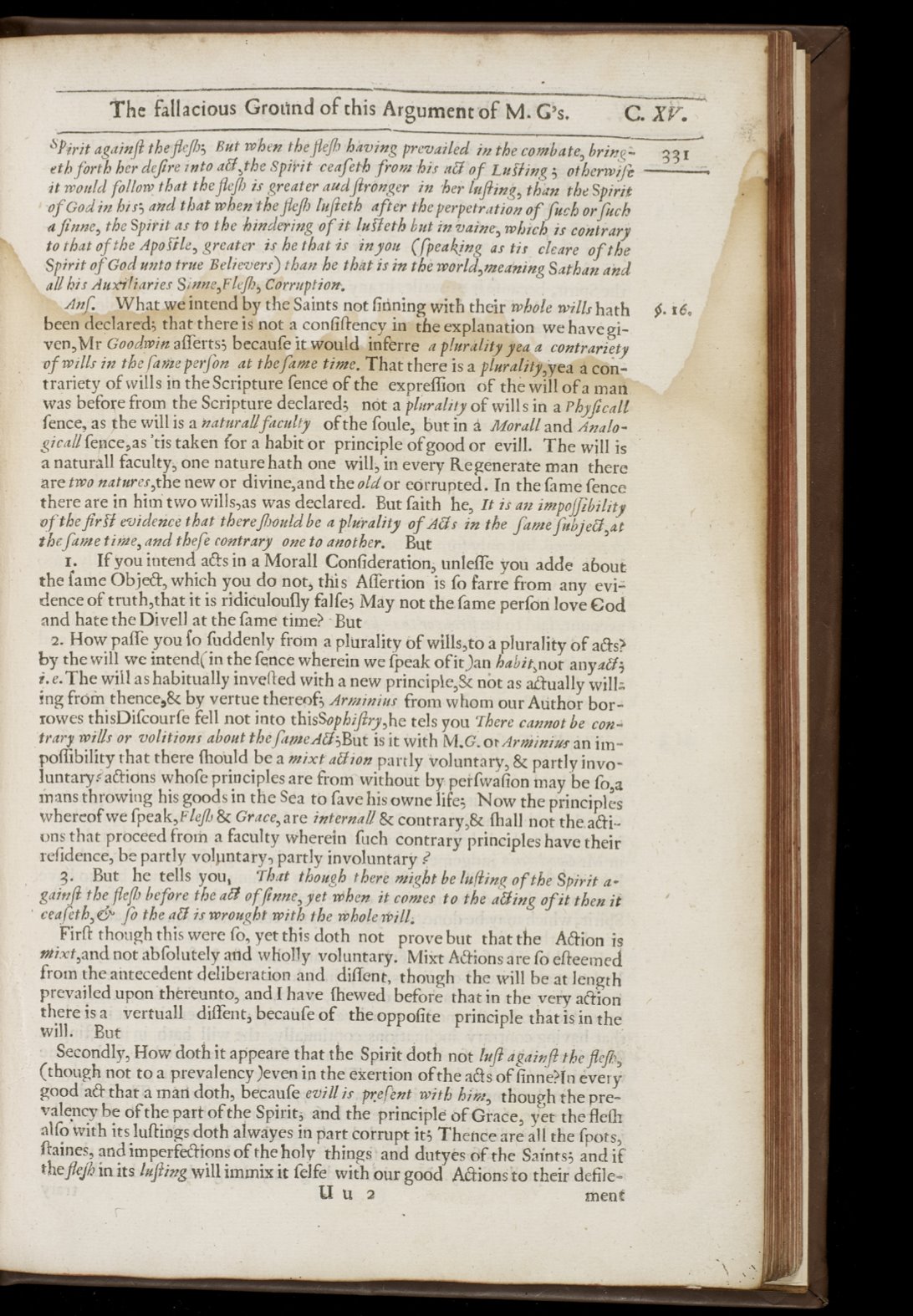

The
fallacious
Ground
of
this
Argument
of
M. G's.
C.
XV
Spirit again
fl'
the
flefb;
Bist
when the
flefh
having
prevailed
in
the
combate, bring=
eth
forth
her
defre into
ail,the
Spirit
ceafeth
from
his
au
of Lulling;
otherwife
it
would follow
that
the
fiefh
is greater andfironger
in
her tufting,
than
the Spirit
of
God
in
his; and
that
when
the
fief/3
lnfleth
after
theperpetration
of
Each
or
fuch
a
ftnne,
the Spirit as to
the hindering 'of
it
luileth
but
in vaine,
which is contrary
to
that
of
the
Apo
1tle,
greater
is
he
that is
input
(f
peaking
as
tis
cleare
of
the
Spirit
of
God unto
true Believers)
than
he
that
is
in
the world,meaning
Sathan
and
all
his
Auxiliaries
Sinne,Flefh, Corruption.
Anf.
What
we
intend
by
the
Saints
not
finning with
their
whole
wills
hath
been
declared;
thatthere
is
not
a
confiftency
in
the explanation
we have
gi-
ven,Mr
Goodwin
afferts; becaufe
it
would inferre
a
plurality
yea
a
contrariety
of
wills
in the
fame
pert'on
at
the
fame
time.
That there
is
a
plurality,yea
A
con-
trariety
of
wills
in
the
Scripture
fence
of
the
expreffion
of
the
will
of
a
mari
.
was
beforefrom
the
Scripture declared; not
a
plurality
of
wills in
a Phyfscall
fence,
as
the
will
is
a
natural/faculty
of
the
foule,
but
in a
Moral!
and
Analo-
gicall
fepce,as'tis taken for
a
habit
or
principle
of
good or
evil
/.
The
will
is
a natural/
faculty; one
nature bath
one will;
in
every
Regenerate
man
there
are
two
natures,the new
or divine,and
the
old
or eorrupted.
In
the
fame fence
there
are
in
him
two
wills,as was
declared.
But faith he,
It
is an
impof
bility
of
the
frrft
evidence
that
thereflwuld
be a
plurality
of
Ails in
the
fame
fubjeú,at
thefame
time,
and theft
contrary
one
to
another. But
1.
If
you
intend
acts in a
Morali Confideration,
unlefhe
you
adde
about
the
fame Obje&, which you
do not, this
Aflertion
is
fo farce
from any
eviz
dence
of truth,that it
is
ridiculoufly falfe; May
not
the
fame perfon love
Cod
and hate the Divell at the
fame
time? But
2.
Howpafie you fo fuddenly from
a
plurality
of
wills,to
a
plurality
of
aets?
by the
will we
intend(in the
fence
wherein
we fpeak
ofit)an
habit-snot
any
ail;
i.e.
The
will
as
habitually invefted with
a new principle,&
nit
as aí`tually
will;
ing from
thenceo&
by
vertue thereof;
Arminius
from whom
our Author
bor-
rowes
thisDifcourfe
fell
not
into
thisSophiftry,he tels
you
There
cannot
be
con-
trary
wills
or volitions about
thefatneAfd;But
is
it with
M.G.
or
Arsniniue
an
im-
pofiibility
that
there
fhoúld
be
a
mixtaElion partly Voluntary,
&
partly invo-
luntary?a
&ions
wholeprinciples are
from'without
by
perfwafìon may
be fo,a
mans
throwing
his
goods in
the
Sea
to
fave his
owne
life;
Now the
principles
whereof
we fpeak,Flefb &
Grace,
are
internal/ &
contrary,&
{hall
not the
a
&i-
ens
that
proceed from
a
faculty wherein
each
contrary
principles
have their
reiidence, be partly
voluntary,
partly involuntary
?
3. But
he tells
you
That
though
there might
be
Billing
of
the
Spirit
a-
gainfl the
fef)
before
the
all
o
f
fnne,
yet
When
it
comes
to the
ailing
ofit
then
it
ceafeth,&
fo
the
áa
iswrought
with the
Whole
will:
Firtt though
this
were
fo,
yetthis
doth not prove but that the
A
&ion is
mixt,andnot abfolutely and
wholly voluntary. Mixt
A
&ions
are
fo
efteemed
from
the antecedent deliberation and
diffent,
though
the
will
be at length
prevailedupon
thereunto,
and.I
have
{hewed
before
that
in
the
very
a
&ion
there
is a
vernal'
diffent, becaufe
of
the
oppofite principle
that
is in
the
will. But
Secondly,
How'doth it appeare
that the
Spirit
cloth
not
lull again fi the
fief,
(though not
to
a
prevalency)even
in
the
exertion
of
the
a&s
of
finne
?{n
every
good
a&
that
a
mad doth, becaufe
evili is
prefent
with him,
though the pre
-
valency
be
of
the
part
of
the
Spirits
And
the
principle
of
Grace,
yet
the
flefh
alfo
with its
linings doth
alwayes in
part corrupt
its
Thence are
all
the fpots,
Raines,
and
imperfe&ions
of
the
holy things, and
dutyesof
the Saints; and
if
the
flefh
hits
lulling
will immix
it felfe
with
our
good
A&ions
to
their
defile -
bIu
a
ment
331










